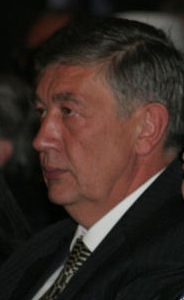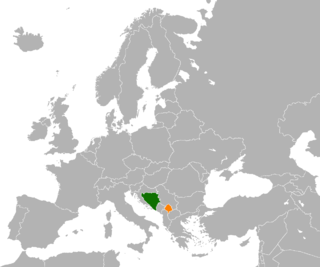
Milorad Dodik is a Bosnian Serb politician serving as the 8th president of Republika Srpska since November 2022. Previously, he served as the 7th Serb member of the Presidency of Bosnia and Herzegovina, the collective federal head of state, from 2018 to 2022.

The Alliance of Independent Social Democrats is a Serb political party in Bosnia and Herzegovina. Founded in 1996, it is the governing party in Republika Srpska, with its leader, Milorad Dodik, serving as the current president of Republika Srpska. The party's vice-president, Željka Cvijanović, is the current member of the Presidency of Bosnia and Herzegovina, while SNSD member Radovan Višković is the current prime minister of Republika Srpska.

The Republic of Bosnia and Herzegovina was a state in Southeastern Europe, existing from 1992 to 1995. It is the direct legal predecessor to the modern-day state of Bosnia and Herzegovina.

Haris Silajdžić is a Bosnian politician and academic who served as the 5th Bosniak member of the Presidency of Bosnia and Herzegovina from 2006 to 2010. He was the 3rd Prime Minister of the Republic of Bosnia and Herzegovina from 1993 to 1996.
This article is about the politics of the Republika Srpska, one of the two entities that together comprise the state of Bosnia and Herzegovina, the other being the Federation of Bosnia and Herzegovina.

General elections were held in Bosnia and Herzegovina on 1 October 2006. They decided the makeup of Bosnia and Herzegovina's Presidency as well as national, entity, and cantonal governments.

Željko Komšić is a Bosnian politician and diplomat who is the 6th and current Croat member of the Presidency of Bosnia and Herzegovina. Previously, he was a member of the national House of Representatives from 2014 to 2018.

Nebojša Radmanović is a Bosnian Serb politician who served as the 5th Serb member of the Presidency of Bosnia and Herzegovina from 2006 to 2014. He is currently a member of the national House of Representatives.
Events from the year 2007 in Bosnia and Herzegovina

General elections were held in Bosnia and Herzegovina on 3 October 2010. They decided the makeup of Bosnia and Herzegovina's Presidency as well as national, entity, and cantonal governments.

Bosnia and Herzegovina relations with Kosovo are unofficial because Bosnia and Herzegovina's central government has not recognized Kosovo as an independent state, essentially through the veto of the Bosnian Serb-dominated Republika Srpska.

Republika Srpska–Serbia relations are the foreign relations between Republika Srpska, one of the two entities in Bosnia and Herzegovina, and Serbia. Republika Srpska has an office of representation in Belgrade and Serbia has a consulate-general in Banja Luka. Serbia and Republika Srpska have signed an Agreement on Special Parallel Relations.

Željka Cvijanović is a Bosnian Serb politician serving as the 8th and current Serb member of the Presidency of Bosnia and Herzegovina, the collective federal head of state. She is also its current chairwoman, since 2022. She previously served as the 9th president of Republika Srpska from 2018 to 2022.
The following lists events that happened during the year 2009 in Bosnia and Herzegovina.
The following lists events that happened during the year 2008 in Bosnia and Herzegovina.
Several referendums have been held in Republika Srpska during its existence, whilst others have been proposed but not happened.

The Dayton Agreement ended the Bosnian War and created the federal republic of Bosnia and Herzegovina (BiH), which consists of the Bosniak and Croat-inhabited Federation of Bosnia and Herzegovina (FBiH) and the Serb-inhabited Republika Srpska (RS). Although the Bosnian Serbs were viewed as "anti-Dayton" during the first years after the war, since 2000 they have been staunch supporters of the Dayton Agreement and the preservation of RS. Bosniaks generally view RS as illegitimate, and an independence referendum from BiH has been proposed in RS. The 2006 Montenegrin independence referendum and Kosovo's 2008 declaration of independence have raised the possibility of a referendum and unification with Serbia. In 2015, after a judicial and police crisis, the governing Alliance of Independent Social Democrats said that it would hold an independence referendum in 2018 if RS's autonomy was not preserved.

General elections were held in Bosnia and Herzegovina on 7 October 2018. They decided the makeup of Bosnia and Herzegovina's Presidency as well as national, entity, and cantonal governments. Voter turnout was 54%.
Events in the year 2018 in Bosnia and Herzegovina.

General elections were held in Bosnia and Herzegovina on 2 October 2022. They decided the makeup of Bosnia and Herzegovina's Presidency as well as national, entity, and cantonal governments.















